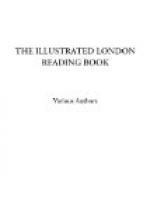We feel plainly that music touches and gently agitates the agreeable and sublime passions; that it wraps us in melancholy, and elevates us to joy; that it dissolves and inflames; that it melts us into tenderness, and rouses into rage: but its strokes are so fine and delicate, that, like a tragedy, even the passions that are wounded please; its sorrows are charming, and its rage heroic and delightful. As people feel the particular passions with different degrees of force, their taste of harmony must proportionably vary. Music, then, is a language directed to the passions; but the rudest passions put on a new nature, and become pleasing in harmony: let me add, also, that it awakens some passions which we perceive not in ordinary life. Particularly the most elevated sensation of music arises from a confused perception of ideal or visionary beauty and rapture, which is sufficiently perceivable to fire the imagination, but not clear enough to become an object of knowledge. This shadowy beauty the mind attempts, with a languishing curiosity, to collect into a distinct object of view and comprehension; but it sinks and escapes, like the dissolving ideas of a delightful dream, that are neither within the reach of the memory, nor yet totally fled. The noblest charm of music, then, though real and affecting, seems too confused and fluid to be collected into a distinct idea.
Harmony is always understood by the crowd, and almost always mistaken by musicians. The present Italian taste for music is exactly correspondent to the taste for tragi-comedy, that about a century ago gained ground upon the stage. The musicians of the present day are charmed at the union they form between the grave and the fantastic, and at the surprising transitions they make between extremes, while every hearer who has the least remainder of the taste of nature left, is shocked at the strange jargon. If the same taste should prevail in painting, we must soon expect to see the woman’s head, a horse’s body, and a fish’s tail, united by soft gradations, greatly admired at our public exhibitions. Musical gentlemen should take particular care to preserve in its full vigour and sensibility their original natural taste, which alone feels and discovers the true beauty of music.
If Milton, Shakspeare, or Dryden had been born with the same genius and inspiration for music as for poetry, and had passed through the practical part without corrupting the natural taste, or blending with it any prepossession in favour of sleights and dexterities of hand, then would their notes be tuned to passions and to sentiments as natural and expressive as the tones and modulations of the voice in discourse. The music and the thought would not make different expressions; the hearers would only think impetuously; and the effect of the music would be to give the ideas a tumultuous violence and divine impulse upon the mind. Any person conversant with the classic poets, sees instantly that the passionate power of music I speak




